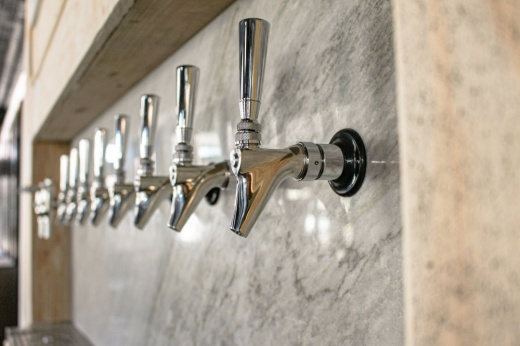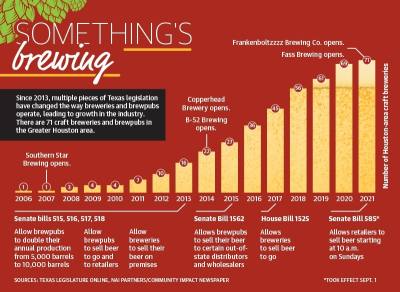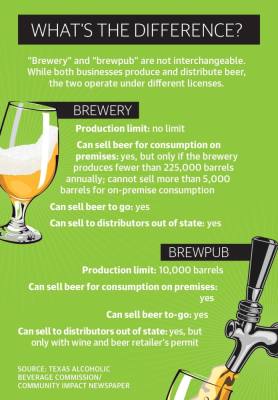Fass Brewing Co. added to that total when it opened its brewpub on Main Street in downtown Conroe in October. It is the sixth craft beer location to open in the area since 2007, joining Southern Star Brewing Co., B-52 Brewing and Copperhead Brewery in Conroe along with Cyclers Brewing and Frankenboltzzzz Brewing Co. in Montgomery. However, Cyclers Brewery recently permanently closed due to damages sustained from Winter Storm Uri in February.
Dylan Emmons, Fass Brewing Co. brewer and president, worked at multiple other breweries in Houston before starting his own.
“I kind of knew I’d never really feel fulfilled until it was our own brewery with our recipes, our process,” Emmons said, who started the brewery with his cousin Aaron Edrington.
Charles Vallhonrat, executive director of the Texas Craft Brewers Guild, said he credits the growth of craft breweries to state legislation passed in 2013 allowing brewpubs to double their production and sell directly to distributors and breweries to sell directly to retailers.
Under Texas licensing laws, breweries can produce an unlimited amount of beer and can distribute across the country, while brewpubs are limited to 10,000 barrels of beer annually and need an additional permit to distribute out of state.
“I can remember when there were only two [breweries], and now there’s 200 within 100 miles,” said Johnny Crawford, president of operations at Frankenboltzzzz Brewing Co., which opened in Montgomery in March.
With the growth of the brewery scene in the Houston area comes increased competition, said Dave Fougeron, the president of Southern Star Brewing Co. While he said there is not much competition between local brewers, some large companies have entered the market, making it more difficult for smaller breweries to compete.
"The big guys have stepped in and are operating under connected brands,” Fougeron said. “They have access to the reach and the distribution power and the money to bully their way in.”
Legislative changes
Legislation passed in 2013—Senate bills 515-518—allows brewpubs to double their production from 5,000 barrels to 10,000 barrels annually and sell their products directly to distributors. The package also allows breweries to sell their brews for consumption on their premises.
“It created the taproom culture that we have today, [and] it lowered the barrier of entry to the market,” Vallhonrat said. “With the taproom model, I don’t have to have as much infrastructure [to] still be able to sell a good volume of beer.”
In 2019, the Texas Legislature passed House Bill 1525, which allows breweries to sell beer to go as opposed to only allowing customers to consume a brewery’s beer on the premises.••“I’m pretty sure we couldn’t have opened this place pre-20[19] when that law passed,” Emmons said.
Vallhonrat said he believes the 2019 beer-to-go law may have saved the craft beer industry in Texas during the COVID-19 pandemic as well.
“Without that ability to sell beer to-go we would have seen [breweries] closed, and if brewpubs didn’t have that we would have definitely seen them close as well,” Vallhonrat said.
The Legislature continued to pass beer and brewery legislation in the 2021 regular session, including HB 1518, which allows alcohol to be sold starting at 10 a.m. on Sundays instead of noon. The change took effect Sept. 1.
Vallhonrat said legislation has not always been friendly to breweries, though. For example, a bill passed in 2013 requires breweries to give up their assets and brand value for free to work with a distributor, and a law passed in 2017 made it more difficult for larger breweries to run a taproom, Vallhonrat said.
Fougeron said although there are more changes he would like to see, such as being able to sell kegs to customers, he said the brewery industry is more profitable now due to legislative changes.
“It’s been a godsend for sure,” Fougeron said. “We’ve had to fight very, very hard for some of these changes to occur.”
Growth in the suburbs
The growth of the brewery scene in Houston has mirrored trends in other areas of the state, such as North Texas and Austin, Vallhonrat said. Because rents are more affordable and there is less local competition with other breweries, the craft beer scene is growing in rural areas, Vallhonrat said.
For Frankenboltzzzz, Crawford said he and brewer Charles Coleman chose to open their brewpub in Montgomery for the city’s small-town atmosphere.
“We’re both small-town boys, so we’re big on loyalty and small communities, and small business is important to us,” Crawford said. “Just coming to Montgomery makes you feel like you’re truly out of town, so that’s the kind of feel we were striving for.”
Tom Emmons, CEO of Fass Brewing, said he and Dylan Emmons were originally looking at a place in Houston for their brewpub. When that fell through, he said they checked out Conroe.
“When we came up here, there was an authenticity to this that you just don’t see everywhere,” Emmons said.
Danielle Scheiner, executive director of Conroe’s Economic Development Council, said the breweries in Conroe play an important role in the community, including supporting other local businesses. For example, Southern Star Brewing Co. sources its aluminum cans from another Conroe business, Crown Beverage Co.
Scheiner said having multiple craft beer options also makes the city attractive for potential new residents and tourists.
“Just like it’s a plus for us to be able to market [the breweries] to new residents to the community that would be part of our workforce, it’s certainly an attractive aspect to market tourism for the community as well,” Scheiner said.
Montgomery Mayor Sara Countryman said having Frankenboltzzzz Brewing Co. and previously Cyclers Brewery, in addition to the area’s wineries, provides more options for visitors to the city attending events such as weddings.
"These wedding venues are busy seven days a week,” Countryman said. “If you come in a little early, what a great way to spend the day before you get into the wedding.”
Increased competition
Fougeron, who has been in the craft beer industry since 1997, said the industry has changed dramatically since he started. He said there used to be an idea that more breweries would lift the entire industry up, but he said as bigger companies have taken more of a share of the market, it has made it more difficult for independent breweries to have success.
Fougeron said the gap between large brewing companies and smaller breweries widened during the COVID-19 pandemic: The former had large enough marketing budgets to survive while the latter suffered. He said he used to employ 21 people but is now down to 13 after initially cutting back to 10 employees.
Despite increased competition with brewers backed by larger companies, Fougeron said there is not the same type of competition between local breweries. He said he thinks having more hyperlocal breweries brings more community awareness to craft beer.
Crawford said local craft breweries are like a family, and the increased competition has led to brewers improving their own recipes and processes to keep up with one another.
“Everyone wants to make the best beer,” Crawford said. “It’s always evolving. You have to stay on your toes to compete in the industry.”
Tom Emmons, who previously worked in the oil and gas industry before starting Fass Brewing, said the craft beer industry is different from what he is used to.
“There is a camaraderie within the brewing industry I think that you don’t see in every other industry,” Tom Emmons said. “It almost seems noncompetitive, which is an attractive thing for us.”








